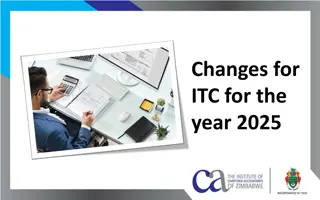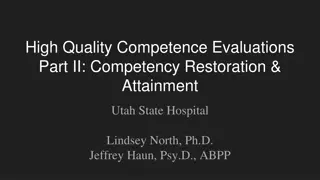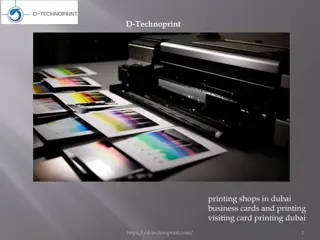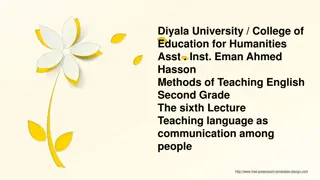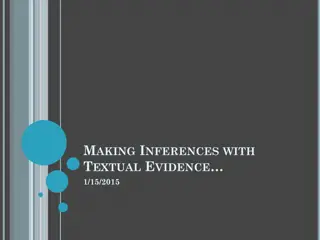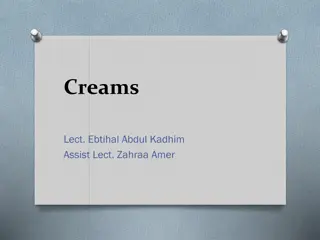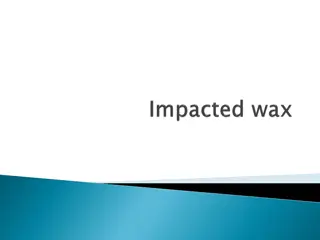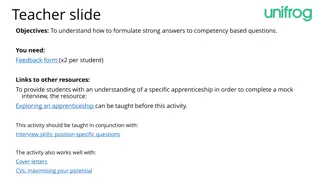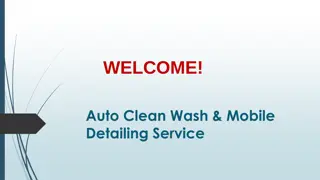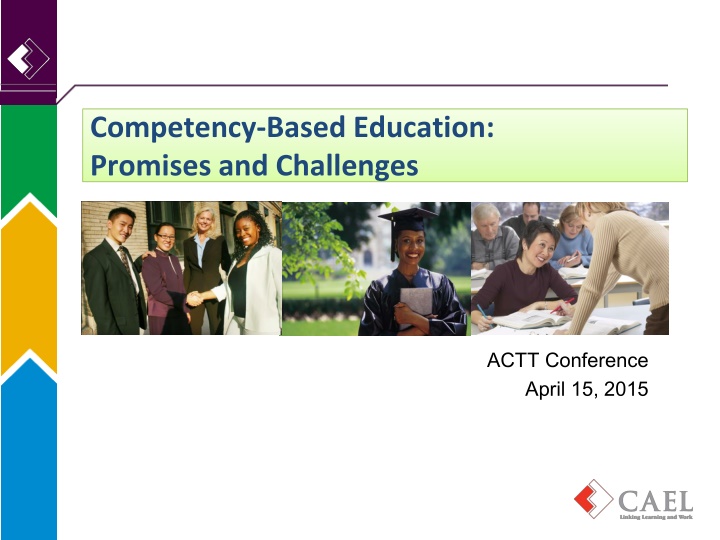
Challenges and Promise of Competency-Based Education in Higher Ed
Explore the challenges and promises of competency-based education in higher education. Discover the importance of critical thinking, communication skills, and problem-solving abilities over specific majors to employers. Uncover the shift in entry-level job requirements and the necessity for clearly defined competencies for students and stakeholders.
Download Presentation

Please find below an Image/Link to download the presentation.
The content on the website is provided AS IS for your information and personal use only. It may not be sold, licensed, or shared on other websites without obtaining consent from the author. If you encounter any issues during the download, it is possible that the publisher has removed the file from their server.
You are allowed to download the files provided on this website for personal or commercial use, subject to the condition that they are used lawfully. All files are the property of their respective owners.
The content on the website is provided AS IS for your information and personal use only. It may not be sold, licensed, or shared on other websites without obtaining consent from the author.
E N D
Presentation Transcript
Competency-Based Education: Promises and Challenges ACTT Conference April 15, 2015
We are encouraged Sources: Lumina Foundation/Gallup Poll 2013 and The 2013 Inside Higher Ed Survey of College & University Chief Academic Officers report 2
Public opinion is not encouraging Sources: Lumina Foundation/Gallup Poll 2013 The 2013 Inside Higher Ed Survey of College & University Chief Academic Officers report 3
Feeling the heat now? Sources: Lumina Foundation/Gallup Poll 2013 The 2013 Inside Higher Ed Survey of College & University Chief Academic Officers report 4
What is all of the fuss about? Concern about accountability in higher education Employers changing work force needs Push for degree completion Innovation and technology Globalization, interdependent world What does a degree mean? 5
Nearly all employers surveyed (93%) agree, a [job] candidate s demonstrated capacity to think critically, communicate clearly, and solve complex problems, is more important than their undergraduate major. Source: It Takes More Than a Major: Employer Priorities for College Learning and Student Success. 2013. Washington DC. Association of American Colleges and Universities and Hart Research Associates. 6
What Is Entry Level? Instead of memorizing 15 or 20 steps in a calculation process, fund accountants at the [State Street] bank now must be able to identify anomalies, help resolve software glitches and figure out which other teams they should work with. In some cases, they must also call clients directly, putting a new premium on people skills. Source: Wall Street Journal, August 6, 2014 Where Did All the Entry-Level Jobs Go? 7
Why Competencies? Quality Clearly define what graduates are expected to know and do Communicate these expectations to students, employers and other stakeholders. (Provides transparency) 8
What is a Competency? Competency = Knowledge + Skill 9
Defining Competencies Beyond learning outcomes Not just skills and knowledge, but also the ability to apply learning in different situations Specific in terms of levels of performance Objectively measured Holistic 10
Competency Example Competency: Critical Thinking Subcompetencies: Define the problem/issue Evaluate evidence or data on the topic Consider context or assumptions in the evidence Propose an interpretation or hypothesis Identify alternatives, conclusions, or implications 11
Competency Exercise Competency: Written Communication Subcompetencies ? ? ? ? ? 12
Changing the Formula Time Fixed X X Learning Variable 13
PLA and CBE Converge Prior Learning Assessment Refresher: PLA is the process for recognizing college-level learning acquired outside of the traditional college classroom . Students must demonstrate that they have achieved the same learning outcomes and/or competencies as a student who passes the course. 14
College-Level Learning College level learning typically refers to learning that is: other than general knowledge; combines practical and theoretical knowledge in ways appropriate to a given field; of a certain level of breadth and/or depth and complexity; is representedin existing college curricula
Adult Learners and PLA Experiential learning, on-the- job learning, employer training, free courses, PD Application or Demonstration Theory May have minimal or no understanding of the theories behind what they do. 16
PLA /CBE are Learner-Centric Successful PLA and CBE students earn credit for what they know and can do, significantly saving them time to a degree or credential. 17
Teaching to Competence A primary focus on competence rather than content shifts the role of faculty to serve more as facilitator of learning rather than content expert
Many Faculty Roles Determining the learning outcomes (competencies, skills, knowledge sets) that students must achieve in order to earn the credential (micro, certificate, or degree). Determining how best to demonstrate the learning Designing the assessments/rubrics Ensuring link with K12, employers, receiving colleges 19
Many Faculty Roles Locating the learning resources, materials, texts, exercises, etc. Mentoring, coaching students Determining how competencies fit throughout the curriculum, levels of competencies (proficiency to mastery), overlap/reinforcement of competencies Teaching/Assessing 20
Principles of Good Assessment Must be reliable, valid, fair, and authentic Must provide useful information about student learning Must provide information that will improve the teaching and learning experience 21
Competency-Based Assessment What are we assessing? Defined competency with appropriately designed and validated assessment/rubric How will students demonstrate the learning or mastery of a competency? Do we use a binary approach or add levels of proficiency? Who will assess it? How do we help the student try again? 22
Competency-Based Assessment Direct Assessment Model Such as College for America Totally divorced from the credit hour and seat time. Competencies established first, then built out how they could be attained Hybrid Models Most popular Competency units = credit hours Still have course organization 23
Competency-Based Assessments Formative and summative assessments How can the student check his/her progress? Practice quiz? Low stakes assignments? Performance-based assessments, narratives/papers, simulations, projects, videos, portfolios, capstones Multiple Choice or Standardized Tests How will the assessments be administered? Are we seeking competency or mastery? Disaggregated faculty role? 24
Academic Consideration Where to start? A new course/micro credential (incremental), program, certificate, degree or institutional shift? PLA? Model: Hybrid or D.A. Faculty roles? Faculty governance and organization? Working with community, employers? Ensuring we fulfill our mission Transfer and articulation 25
Administrative Considerations Infrastructure concerns: SIS How will we produce a transcript? Business model: Subscription or $ per credit hour? Permissions: Accrediting Body Resources for planning: such as providing release time for faculty, funding, etc. 26



